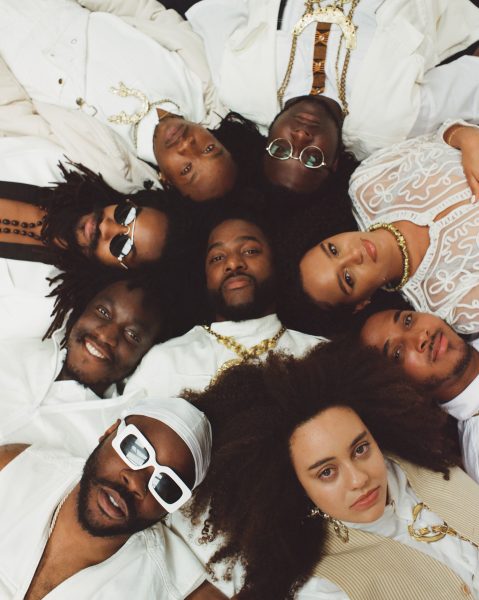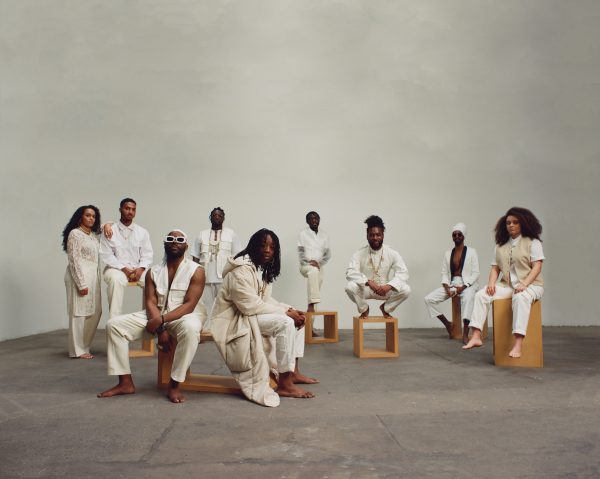
Steam Down founder Ahnansé on his influences, Griot culture and the power of music
If you’re not already in the loop, Steam Down are the collective force of energy that tear up a Southeastern part of London every Wednesday night at the Matchstick Piehouse in Deptford, and have done for the past three years. Each week, their core members, plus a few guests (usually vocalists) link up to play to a dedicated following, who are notified of ticket sales via WhatsApp. Fans can support Steam Down via subscription platform The Floor in return for early bird ticket sales, because SD Weekly usually sells out.
Steam Down was founded in 2017 by multi-instrumentalist Wayne Francis, artist name Ahnansé, who fronts Steam Down and leads their improvised sections at gigs, usually wearing his signature boiler suit. Since then, they’ve appeared on stages at festivals, from Green Man to Glasto, and beginning on the 17th October, they’re heading off on tour with their brand new EP ‘Five Fruit’. Ahnansé sat down with Dummy to talk about the origins of Steam Down and everything we can expect from them next.
Who are Steam Down?
If you want to describe the sound, I’d say it’s a combination of afrobeats, hip hop and jazz. Those are the three main things if you want to explain it to somebody in its simplest form. However, I think you can break those down into a lot of difference spaces. Ultimately, I think you need to experience it. We haven’t really coined a term or one word that describes it yet!
Are Steam Down a collective?
I would say Steam Down is a music organisation. Part of it is an artist collective, part of it is a weekly event, and outside of that we have a writing group.
Are some of the people who do the writing people who we don’t see on stage?
Mostly people are on stage but sometimes people might not be. There’s a bit of both.
How did all of the members get involved?
So many different ways but they are mainly people I have met across the scene – friends of friends – Benji the drummer is friends with Dom (on keys). Zu and Tinyman (both vocalists) have been friends for a while, so they came into the project together. They are all people who have crossed paths, it started very organically.
Who had you played with before starting Steam Down?
I played with a couple of people before – I’m trying to think who to pull from the list – the main band I played with before was United Vibrations and that was a project with Yussef Dayes, his brothers and myself. Before that I also played in a project called Family Atlantica which was an Afro-Venezuelan project. And outside of that I’ve done quite a lot of different sessions with people through the years.
The new EP’s lyrics are multi-lingual – would you say you have been influenced by sounds from outside of the UK?
That’s interesting. Generally speaking, I would say all of the influences are found in London because the city is a cultural melting pot. Shumba Maasai (who is featuring on ‘Can’t Hold Me Back’) is from Zimbabwe originally but was born here. He jumps between both languages. Anything with Afronaut Zu in, might switch between Yoruba and English. So, I think everybody’s comfortable with cultural weaving.
And it works so well!
Yeah, and it’s fun. We also all learn about each other’s cultural backgrounds. We learn different bits of words and language.
Is there one thing that unites all Steam Down members?
We’re all from the African-Diaspora and I think that’s the kind of wider space we operate in. There are threads that run across all of the cultures. I think all of us intuitively tap into that space and that’s really important.
Is that something you intended to achieve with Steam Down?
It was definitely intentional. When I was a lot younger, I played with a lot of West African musicians – I called it my second education. In West Africa they have what is called a Griot Culture and the Griot plays a strong role in society. A lot of those who are part of Steam Down are really aligned with those cultural traditions and want to bring some of those values back into what we do with our music. So, I think Steam Down has a wider cultural purpose of bringing those things together rather than even the musical things.
Can you talk more about those values?
Traditionally Griots are the storytellers and historians of culture. It’s their job to be the historians of the area, but also have an idea of the global history and things that are going on. Within them they hold and preserve the culture, as well as advance it by creating the stories of the time and advancing the sound. It’s the past, present and future all together.
Is that because of Oral tradition?
With the Malian Empire yes, the oral tradition is there but they have had a rich tradition since the thirteenth century. Some of the earliest universities were there in the twelfth century. So, I think this way of communicating with music makes it easily accessible for a wide range of people. From kids to adults – there’s a space for everybody within that. I would say it does stem from oral tradition, which is precedent.
That sounds like something that is reflected in Steam Down…
Yeah definitely. Steam Down is for those who are a bit older and more experienced, and those that are younger and coming up. Something I’ve always wanted to do was have a space for young people’s growth, and have more established musicians share their knowledge with them.
What are the reasons for the resurgence in jazz, especially in South London?
There are a couple of reasons. I would say one is that there are a couple of nights that started about five or ten years ago; I used to run a night called 12TONE, and there were also events like STEEZ and The Total Refreshment Centre. Those nights took the music out of the traditional jazz club setting and they made them more casual; at more events, everyone was standing up in the venues. It felt more like a club environment than going to a sit-down jazz concert, and that changes everything. It changes how the music is played – it’s louder, the sound system is louder, and a slightly bigger space gives it that feel. I think that changed the whole culture. The music had a space to thrive in.
Over the last twenty years or so it has been a lot easier to write some bars over a beat than it has been to play an instrument.
The other thing is the educational spaces, places like Tomorrow’s Warriors, have really pushed that. And other places like The Midi Music Company always has a space for young people to come together and create. There are multiple factors but there’s a strong educational arm and venue spaces that jazz previously wasn’t in.
What is the importance of educational spaces like Tomorrow’s Warriors?
Isobella Burnham (SD bassist) definitely came through Tomorrow’s Warriors. I think some of the other musicians came through different places but my whole take on the education space is that having easy access to live music is one of the key things that has empowered young people. Traditionally over the last twenty years or so it has been a lot easier to write some bars over a beat than it has been to play an instrument. Instruments cost money and lessons cost money, so there’s a price barrier, but spaces like Tomorrow’s Warriors and School Ground Sounds give young people spaces to come and play for free, enriching young people in ways that I don’t think they’d otherwise have access to.
You guys continued to play through parts of the pandemic when audiences had to be seated in venues. Did this change the way you played?
We played differently and I think we only realised how differently we played when we had a stand-up audience again. I think it was a retrospective realisation. When we had the sit-down audiences there was more of a cosy energy. Even when we played music that was getting people moving, we didn’t get to the same energy levels as when everybody was standing. It was kind of unnatural for us to do that. There were some people that were wiggling and trying to get up, but we had to tell them to sit back down.
There were some people that were wiggling and trying to get up, but we had to tell them to sit back down.
Also, there’s a lot more empty space so even the sound of the room is different and that makes you play really differently. You feel like you’re playing louder than you’re actually playing just because you get a lot of reverberation back, so I think we played a lot quieter, which changes the energy. It felt good for me – I really enjoyed some of those shows because we got a bit more of an inner experience than an externalised one, which is really nice, but it’s also not what people are used to at Steam Down.
Why did you call your new EP ‘Five Fruit’?
The name came at the end of the process, and it came with the song ‘Five Fruit’. We came up with this musical idea on the sonic side of things. I was taking different fragments of the other songs and putting them together. So, if you listen to the chorus of ‘Five Fruit’ it taps into bits of all of the other four songs. The whole idea is that each of the songs have a different emotional tone or feeling.

So, the first song is about openness and being open to the journey that you’re about to go on and having the courage to do that. The second song ‘Untie’ is about being gentle with yourself and having compassion if you’re going through anything physical. The third song ‘Empower’ is about confidence. The fourth song ‘Free My Skin’ is about release and letting go of things once you realise that they’re bad! And then the last one ‘Can’t Hold Me Back’ is about resilience. For me all of the different songs have a different energy or mood that fits the ideas of those songs. ‘Can’t Hold Me Back’ has this grimey energy – it’s quite warrior-like – it’s quite resilient and resistant. ‘Free My Skin’ is like a release – when it drops in everybody dances and let’s go of everything. ‘Empower’ is almost gospel – it is empowering and confident. ‘Untie’ is more gentle and ‘Five Fruit’ is cerebral and ethereal.
What’s the writing process?
Sometimes we start with an idea that we created at the weekly night. Other times it’s an idea that one of us produces or creates and then everyone else jumps in on it. My job is to pull it all together. I write bits of music also, but I kind of keep the overriding vision, so a lot of the time there’ll be an idea of a concept and then potentially the topliners will write to that beat. And if there’s a backbone of an idea, others will jump in and interpret the part. It might be a keys part that is created and then they’ll embellish that idea.
So, the concept of a jam is taken into what you record as well?
I’m going to call SD Weekly an improvised night because I think jams are a bit less controllable. Within the improvised show we create nuggets of ideas that will be turned into something.
You can expect all of the five fruit to be in full bloom!
What can people expect from the tour?
You can expect all of the five fruit to be in full bloom! There will be more of what you expect from Steam Down and there’ll definitely be lots of new musical journeys and stories. It’s the first time that we’re going to be playing a body of work live and I think we’re going to be doing this tour with most of the members so it’s going to be on a slightly larger scale than the weekly Steam Down.
You always start Steam Down with a polite set of rules. What’s the intention behind that?
I’d say they’re guidelines. They’re there to create the right environment for the music to thrive in. When I was younger and I would go out playing, I wondered ‘Why are people talking over me’, and why is that the culture in London? I remember going across and touring in Europe and that not being the culture of the space but its what people are used to here.

I really didn’t want that for this space, so we say what we want at the beginning and explain to people why, which is that you’ll enjoy the music a lot more when nobody is chatting over it. You don’t realise the effect that it has if everybody’s chatting over it. And for those people who really do want to listen in the audience, it’s disrespectful for them and the musicians who are on stage. It makes me wonder what we’re here for.
In the early days of Steam Down there were some… misogynistic tendencies, so that’s why the ‘no badman business’ rule came in. I remember the first time I did it, my friend said there was a guy behind her that took two steps back. The last guideline is that you come here to enjoy yourself – we’re all in this together!
You also leave your audience with a message on their way out…
I think this goes back to the Griot idea, which is that music should be used for a purpose. It isn’t just as enjoyment – or it is, but enjoyment is a purpose. What is the power of joy on our emotional and mental health? Those are the kind of questions I ask myself as a musician. It’s all about the energy that you feel at the time, and I know there have been times in my life where I’ve had a particular feeling or had negative energy on me, but I got into the space of music, and I’ve completely forgotten where I was before and what was happening. I think in terms of giving people a break, that’s really powerful. But also, if we as a society start using creativity for a purpose and function, I think it will contribute to better mental health all around. I think that’s an important thing for all of us.
Stream or download ‘Five Fruit’ here.
Buy tickets to the ‘Five Fruit’ tour here.
Read next: The 10 Best Jazz Releases Of All Time, according to Blue Lab Beats.













